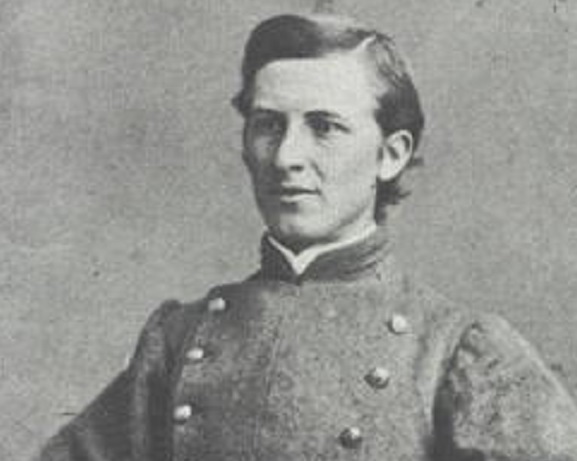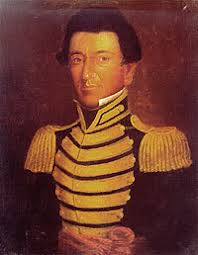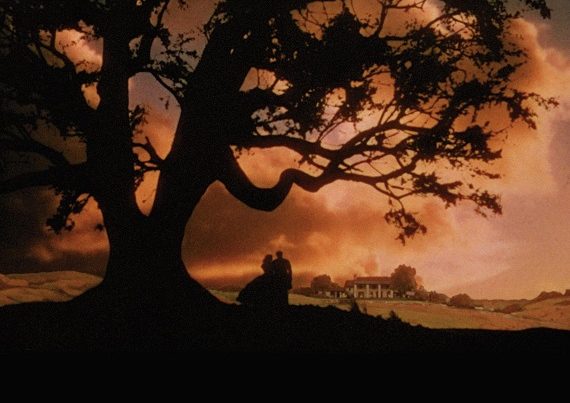It was Thursday, Christmas day of 1862, and the guns at Fredericksburg had fallen silent just ten days before with over ten thousand Union soldiers of the Army of the Potomac and half that number of Confederates from the Army of Northern Virginia lying dead or wounded beyond the city. That night, a twenty-one year old cannoneer from Richmond, Lieutenant William Gordon McCabe, sat in his bivouac penning some lines of verse . . . a poem in which he took a bit of literary license, as the weather that December in Virginia was unseasonably warm and would become even warmer the following month when the retreating Union Army virtually sank in a sea of melting mire during its humiliating “mud march” northward. The following poem was soon published in a number of Southern newspapers, such as Richmond’s “Southern Literary Messenger.”
“The wintry blast goes wailing by,
the snow is falling overhead;
I hear the lonely sentry’s tread,
and distant watch-fires light the sky.
Dim forms go flitting through the gloom;
The soldiers cluster round the blaze
To talk of other Christmas days,
And softly speak of home and home
My saber swinging overhead,
gleams in the watch-fire’s fitful glow,
while fiercely drives the blinding snow,
and memory leads me to the dead.
My thoughts go wandering to and fro,
vibrating ‘twixt the Now and Then;
I see the low-browed home again,
the old hall wreathed in mistletoe.
And sweetly from the far off years
comes borne the laughter faint and low,
the voices of the Long Ago!
My eyes are wet with tender tears.
I feel again the mother kiss,
I see again the glad surprise
That lighted up the tranquil eyes
And brimmed them o’er with tears of bliss
As, rushing from the old hall-door,
She fondly clasped her wayward boy –
Her face all radiant with they joy
She felt to see him home once more.
My saber swinging on the bough
Gleams in the watch-fire’s fitful glow,
while fiercely drives the blinding snow
aslant upon my saddened brow.
Those cherished faces are all gone!
Asleep within the quiet graves
where lies the snow in drifting waves, –
And I am sitting here alone.
There’s not a comrade here tonight
but knows that loved ones far away
on bended knees this night will pray:
“God bring our darling from the fight.”
But there are none to wish me back,
for me no yearning prayers arise
the lips are mute and closed the eyes –
My home is in the bivouac.”
Even though the overwhelming Confederate victory at Fredericksburg was a welcome present for the beleaguered South on this second Christmas of the War, it did little to restore the festive season that had reigned in the antebellum days. Unlike New England where the celebration of Christmas had been illegal or and least severely frowned upon until the mid-Eighteenth Century and did not even become an official holiday in the United States until 1870, the season had always been a joyful time throughout the South. Homes had been decorated, Christmas trees lit with candles, holiday parties given and presents exchanged, with Saint Nicholas paying a visit to all the Southern children each Christmas Eve. As the War dragged on, however, such happy times began to grow ever more dim as it became difficult to obtain the usual necessities for the season and letters from those on the fighting fronts became the dearest presents. In the wartime Southern homes, virtually all imported goods were impossible to to obtain, honey and sorghum had to be substituted for sugar in making Christmas cakes and candies and gifts were mainly hand made or created from recycled items, particularly the gifts for the children. In this respect, fanciful tales were created to explains Santa’s failure to fill their Christmas stockings, such as how the blockade prevented his visits to the South. Some parents told their children that Santa Claus was actually a Yankee and had been stopped at the border, while others went even further by saying that Father Christmas had been shot by the Yankees. Even at the Confederate White House, President Davis and his family had little in the way of Christmas celebrations, as revealed in letters written by First Lady Varina Davis. In one such letter Mrs. Davis wrote that General Lee had visited the residence a few days before Christmas while she was working in Richmond helping to repair old toys as gifts for orphan children. She said that the general had stopped by to apologize for mistakenly receiving a barrel of sweet potatoes that was supposed to be delivered to the White House for the holidays. Lee said he had distributed the potatoes to the troops, and Mrs. Davis told him she was most pleased that the food had gone to the soldiers instead.
At the battle of Fredericksburg, Lieutenant McCabe had served as the adjutant to another twenty-one year old officer from Richmond and a fellow student at the University of Virginia, Captain William Ransom Johnson Pegram, who had most effectively commanded a battery of horse artillery in Major General A. P. Hill’s division on the Confederate right flank. Young Pegram would later rise to the rank of colonel and die in action at the Battle of Five Forks a few days prior to General Lee’s surrender at Appomattox Court House, while McCabe would become a captain and survive the War to become a well-known author and translator, as well as an educator who founded his own university preparatory school, first in Petersburg and later in Richmond, and served as its principal for forty years. After Colonel Pegram’s death, Captain McCabe stated at his funeral that Pegram had never lost a gun during his four years of service until the one at which he died was captured. Two decades later McCabe, who had obtained the bullet-ridden battle flag of Pegram’s battalion from the dead colonel’s mother, would present it at a reunion of the battalion’s veterans.
William McCabe came from a highly respected Richmond family in which his father, Reverend John Collins McCabe, was a noted authority on Virginia’s colonial church history, his great grandfather, James McCabe, had been an officer under General Benedict Arnold in the invasion of Canada during the Revolutionary War, and his great, great grandfather, George Taylor, was a signer of the Declaration of Independence. Reverend McCabe was also a close friend of Edgar Allen Poe when Poe was serving as editor of Richmond’s “Southern Literary Messenger.” Prior to the War Between the States, the elder McCabe had been the rector of the Church of the Ascension in Baltimore and later the rector of Saint Anne’s Parish in Maryland’s Anne Arundel County. When Virginia seceded in 1861, Reverend McCabe bravely sailed back to Richmond through the Union blockade and became the chaplain of the Thirty-Second Virginia Infantry Regiment. The following year, he was appointed as the chaplain general of Richmond’s prisoner-of-war facilities, including Libby Prison, a post he held until the end of the War. His son William entered the University of Virginia in 1860 but when war broke out a year later, he , like William Pegram and many other of the University’s students, left their classes to offer their services to the Confederacy, with young McCabe marching to Harper’s Ferry as a member of the Student Guard and then volunteering as a private in the Richmond Howitzers. After serving with that artillery unit throughout the Peninsula Campaign in 1862, McCabe was commissioned a first lieutenant and appointed as adjutant of Atkinson’s Heavy Artillery Battalion. Following his service at Fredericksburg with Captain Pegram’s Battery, Lieutenant McCabe was transferred to Lightfoot’s Light Artillery Battalion in 1863 where he saw action during the battle at Chancellorsville.
Later that year, McCabe became the assistant adjutant-general in Charleston where he was involved in the successful defense of Fort Sumter, as well as that of Battery Wagner on Morris Island. The latter fortification was the scene of both naval bombardments and two land assaults, the first by a single brigade in June of 1863 and the second a month later by a much larger force of ten regiments headed by the Fifty-Fourth Massachusetts Regiment of United States Colored Troops . . . the attack depicted in the the 1989 film “Glory.” For his service in South Carolina, General Beauregard recommended McCabe’s promotion to captain and placed him on the staff of Brigadier General Walter Stevens, the chief engineer in the Army of Northern Virginia. Then, in 1864, McCabe rejoined Colonel William Pegram and became adjutant of Pegram’s Light Artillery Battalion, participating in all its battles from the Wilderness to Five Forks, the scene of Pegram’s death. Rather than surrendering with General Lee at Appomattox on April 9, Captain McCabe and several other artillery officers made their way to Greensboro in North Carolina to join Generals Johnston and Beauregard. Johnston, however, realized that all was lost and after several days of negotiations with Union General William Sherman, surrendered the remaining troops in the Army of Tennessee on April 26.
Following Johnston’s surrender, McCabe returned to Richmond to receive his parole the following month and by October of that year he had already established his school in Petersburg. His rapid efforts to help restore the South’s educational system were soon widely recognized, even in the North. A month after the school opened its doors, the “Nation” magazine in New York wrote that “such a school as McCabe’s would be an honor to any state,” and the following month the “Atlantic Monthly” in Boston wrote that there would be “nothing better the South can do in her schools than to take this (McCabe’s) school as a model.” During the forty years of the school’s existence, its graduates went on to win high honors at not only the University of Virginia but many other leading universities throughout the South and even at such great Northern institutions as Harvard, Princeton, Yale and Columbia, as well as the military academies at West Point and Annapolis. A year after the school closed in 1901, McCabe was offered the newly created post as president of the University of Virginia and while he declined the position, the University named him to its Board of Visitors where he served as vice-rector for several years, as well as hanging a portrait of McCabe by the noted English artist, Walter Chamberlain Urwick, in one of the University’s halls.
Aside from his academic duties, William McCabe also served for many years as the president of several Southern institutions, including the Virginia Historical Society, the Westmoreland Club of Richmond and the Virginia chapters of both the Sons of the Revolution and the Society of the Cincinnati. The former Confederate officer was also a member of the Virginia Gettysburg Monument Commission, as well as the State commissioner and director of the 1905 Jamestown Exposition. McCabe was also well known as an author and translator, including his noted 1879 anthology of heroic poems by many renowned writers from both America and abroad, “Ballads of Battle and Bravery,” his various historical works, biographies, Latin text books and a translation of “Caesar’s Gallic Wars,” which won him fame as one of the nation’s leading Latin scholars, as well numerous article for various publications in both America and Great Britain. While McCabe had penned another widely-published and highly nostalgic wartime poem, “Dreaming in the Trenches” which he composed in 1864 during the siege of Petersburg, perhaps the lines he wrote in December of 1862 at Fredericksburg best invoked the feeling of sadness and despair that was then being felt throughout the South at Christmastime.








One Comment